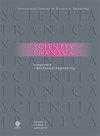Sustainable pomegranate supply chain network design considering cultivation process and water consumption
IF 1.9
4区 工程技术
Q2 ENGINEERING, MULTIDISCIPLINARY
引用次数: 0
Abstract
Agricultural activities have adverse effects on the environment by emitting greenhouse gases and consuming great deals of freshwater. In addition, fruits constitute a substantial part of agricultural products used for balancing diets. In particular, pomegranate is one of the most used products by people of different cultures. In this study, a multi-objective mathematical model was developed to balance sustainability dimensions by focusing on selecting the optimal cultivation process and determining the optimal material flows between pomegranate supply chain facilities. The proposed model maximizes the total profit and the number of created job opportunities due to cultivation process selection and the establishment of plants. It also addresses the environmental impacts by minimizing fertilizer, pesticide, and water consumption in pomegranate cultivation. The model also considers the reverse flow of pomegranate peel and seeds to recapture the value of these products, commonly known as waste. A real case in the Mazandaran province of Iran was considered for validating the developed model. Finally, comprehensive sensitivity analyses were performed on the influential factors of the problem, and managerial implications are presented.考虑栽培过程和耗水量的可持续石榴供应链网络设计
农业活动排放温室气体,消耗大量淡水,对环境造成不利影响。此外,水果在用于平衡膳食的农产品中占很大比重。特别是石榴,它是不同文化背景的人们使用最多的产品之一。本研究建立了一个多目标数学模型,通过选择最佳栽培过程和确定石榴供应链设施之间的最佳物料流,来平衡可持续性维度。所提出的模型最大限度地提高了总利润以及由于选择栽培流程和建立工厂而创造的就业机会数量。该模型还通过最大限度地减少石榴种植过程中的化肥、农药和水的消耗来解决对环境的影响。该模型还考虑了石榴皮和石榴籽的逆向流动,以回收这些产品(通常称为废物)的价值。为验证所开发的模型,考虑了伊朗马赞达兰省的一个实际案例。最后,对问题的影响因素进行了全面的敏感性分析,并提出了对管理的启示。
本文章由计算机程序翻译,如有差异,请以英文原文为准。
求助全文
约1分钟内获得全文
求助全文
来源期刊

Scientia Iranica
工程技术-工程:综合
CiteScore
2.90
自引率
7.10%
发文量
59
审稿时长
2 months
期刊介绍:
The objectives of Scientia Iranica are two-fold. The first is to provide a forum for the presentation of original works by scientists and engineers from around the world. The second is to open an effective channel to enhance the level of communication between scientists and engineers and the exchange of state-of-the-art research and ideas.
The scope of the journal is broad and multidisciplinary in technical sciences and engineering. It encompasses theoretical and experimental research. Specific areas include but not limited to chemistry, chemical engineering, civil engineering, control and computer engineering, electrical engineering, material, manufacturing and industrial management, mathematics, mechanical engineering, nuclear engineering, petroleum engineering, physics, nanotechnology.
 求助内容:
求助内容: 应助结果提醒方式:
应助结果提醒方式:


